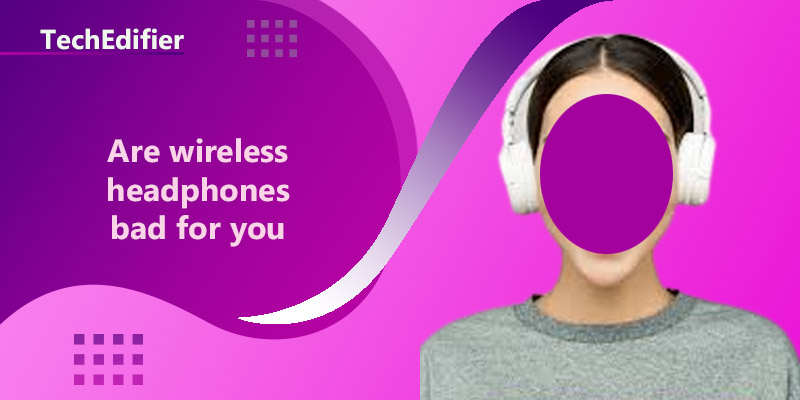Wireless headphones, like other wireless devices, emit radiofrequency (RF) energy, which is a form of non-ionizing radiation. The levels of RF energy emitted by wireless headphones are generally considered to be low and safe for most people to use.
However, some experts have raised concerns about the potential long-term health effects of exposure to low-level RF energy, especially for children and pregnant women. There is currently no clear evidence that wireless headphones pose a significant health risk.
It is important to note that there is ongoing research on the potential health effects of RF energy, and the findings are mixed. Some studies have suggested that long-term exposure to low-level RF energy may be associated with an increased risk of cancer, while other studies have found no such association.
If you have any concerns about using wireless headphones or other wireless devices, it is always a good idea to consult with a doctor. Also, the World Health Organization (WHO) and International Commission on Non-Ionizing Radiation Protection (ICNIRP) have set up guidelines on the exposure to RF energy, and many wireless devices are certified to meet these guideline to ensure safety.
Related Posts:
- Best modem for apartment
- Best linux wifi adapter
- Best laptop for network engineer
- Best kali linux wifi adapter
- Best motorcycle earbuds noise cancelling bluetooth
- Best bluetooth boat speaker
Are wireless headphones harmful to the brain
Wireless headphones, like other wireless devices, emit radiofrequency (RF) energy, which is a form of non-ionizing radiation. The levels of RF energy emitted by wireless headphones are generally considered to be low and safe for most people to use.
However, some experts have raised concerns about the potential long-term effects of exposure to low-level RF energy on the brain, especially for children and pregnant women. Studies have been conducted to evaluate the potential effects of RF energy on the brain, but the findings are mixed and more research is needed.
The World Health Organization (WHO) states that RF energy exposure from wireless devices is not likely to cause harmful health effects, but suggests that more research should be done to better understand the potential long-term effects of RF energy on the brain, particularly in children and pregnant women.
It is important to note that there is currently no clear evidence that wireless headphones pose a significant risk to the brain. However, if you have any concerns about using wireless headphones or other wireless devices, it is always a good idea to consult with a doctor.
What does Bluetooth do to your brain?
Bluetooth is a wireless technology that uses radiofrequency (RF) energy to communicate between devices. The levels of RF energy emitted by Bluetooth devices are generally considered to be low and safe for most people to use.
There have been some concerns raised about the potential effects of RF energy on the brain, but the research on this topic is mixed and more studies are needed to better understand the potential long-term effects of RF energy on the brain.
The World Health Organization (WHO) states that RF energy exposure from wireless devices is not likely to cause harmful health effects, but suggests that more research should be done to better understand the potential long-term effects of RF energy on the brain, particularly in children and pregnant women.
It is important to note that there is currently no clear evidence that Bluetooth devices pose a significant risk to the brain. However, if you have any concerns about using Bluetooth or other wireless devices, it is always a good idea to consult with a doctor.
People Are Also Reading:
👉 Top Reviews
- [Top-rated] Best bluetooth headphones for mowing the lawn
- [Top rated] Best wifi extenders for cox cable – review in 2023
- [Top-Rated] Best Bluetooth Ski Helmet Speakers
- [Top-rated] Best bluetooth speaker for garage
- [Top Rated] Best Bluetooth Speaker For Golf Cart – Review In 2023
👉 Top Tech News
- How many wireless networks unifi
- Is keyboard the same as piano
- What is the frequentcy of Bluetooth
- Why wireless keyboard not working
- Why internet not working on tv
👉 Top WiFi Routers
- Why is ATT Internet So Slow? (How To Fix Internet Speed Issues)
- TP-Link AX1800 WiFi 6 Router (Archer AX21) Top Features
- NEXTBOX WiFi Extender Setup Guide
- TP-Link AC1300 USB WiFi Adapter(Archer T3U) Top Features
- Best WiFi Extender for Arris Router
